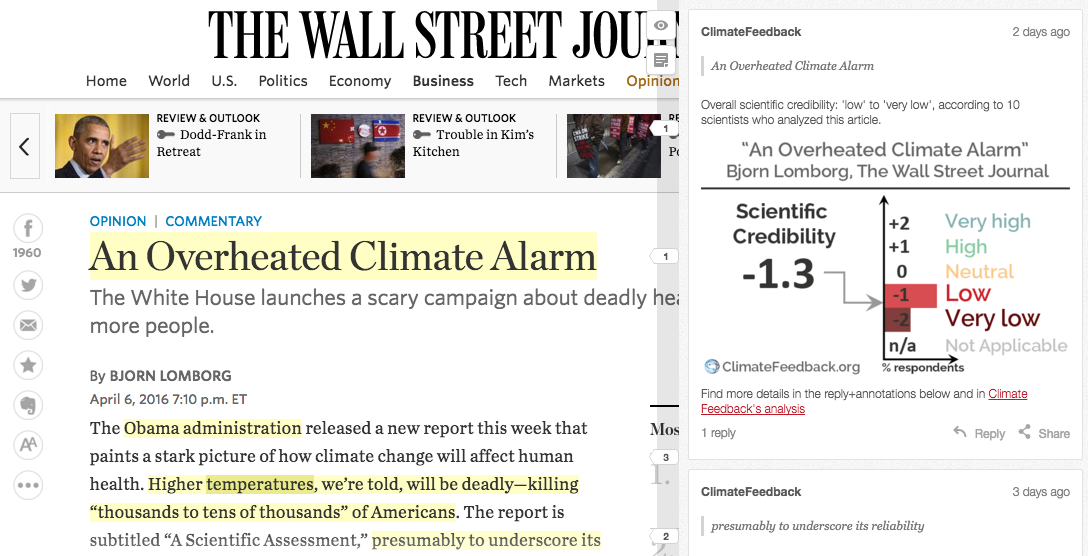Open letter to the Wall Street Journal editor: a scientists’ response to Lomborg's misleading op-ed
Posted on 14 April 2016 by Guest Author
This letter was submitted to the editor of the Wall Street Journal who did not publish it.

On April 6, 2016, the Wall Street Journal published an opinion piece by Bjorn Lomborg entitled “An Overheated Climate Alarm” following the publication by the US Global Change Research Program (US GCRP) of a comprehensive overview of the impact of climate change on American public health. Ten scientists from around the world who have expertise in climate change and its impacts on human health have completed an in-depth analysis of Lomborg’s op-ed and conclude his account of the available evidence is misleading your readers.
While the US GCRP report is based on thousands of scientific publications, Lomborg cherry-picked only a few to support his case that 1) “cold kills many more people than heat” and 2) “climate change will reduce the number of cold days” and “that will cut the total number of cold-related deaths.”
To support his first point, Lomborg relied on a study published by Dr Antonio Gasparrini in The Lancet. Dr Gasparrini, Senior Lecturer in the London School of Hygiene and Tropical Medicine, told Climate Feedback that Lomborg’s account of his own work was “misleading”. He added that “the aim of this study is to establish the association between non-optimal temperature and mortality in the recent past. The article clearly acknowledges that these results cannot be easily extrapolated to the future.”
Kristie Ebi, Professor of Global Health at the University of Washington, adds that “Mr. Lomborg is confusing seasonal mortality with temperature-related mortality. It is true that mortality is higher during winter than summer. However, it does not follow that winter mortality is temperature-dependent.” The fact that people are more likely to die in winter has more to do with “incidence and virulence of influenza and similar diseases” says Philip Staddon, Philip L Staddon, Associate Professor at Xi'an Jiaotong - Liverpool University.
In response to Lomborg’s second point, Dr Staddon commented: “The assertion that warmer winters equals less mortality is a schoolboy error.” Prof. Ebi concluded that “there is very limited scientific support for the claim that reducing the number of cold days will reduce the number of cold-related deaths.”
Emmanuel Vincent, Scientist at the University of California, Merced — Lead Scientist of ClimateFeedback.org































 Arguments
Arguments






























Another factor which makes bacterial and viral diseases more prevalent in winter is the lower level of solar radiation. UV light is a very good sterilant but its effect is much reduced in winter so viruses and bacteria will hang around on surfaces much longer and be more readily transferred.
As the planet warms, it also holds more water vapor. Dry cold air, held still next to the body, will warm rapidly to body temperature due to its low specific heat, but wet cold air will not: so you lose heat faster in wet air. So that works against Lomborg's argument 2 ("climate change will reduce the number of cold days").
I read both letters. I am not surprised your "Guest Letter" was not published. It was poorly argued and missed a major point that populations can migrate. In fact the original Global Change.gov document was lacking too. While it was much more comprehensive than either of these 2 letters, it was still one sided and neglects to mention any benefits of a warmer climate. There is a term for government documents that provide information of a biased or misleading nature, used to promote or publicize a particular political cause or point of view: Propaganda.
[JH} Sloganeering snipped.
Bjorn Lomborg is stuck with his name and reputation. For a great while now, I see his name and associate it with pandering,,, financial and ideological.
Every so often, I check in and read about him, and it only reinforces the validity of the labels. Thanks for checking him again.
>>“cold kills many more people than heat” and 2) “climate change will reduce the number of cold days” and “that will cut the total number of cold-related deaths.” <<
What on earth has the number of cold related deaths to do with the number of heat related deaths caused by food shortages, sea level rise and all the rest. It's not cherry picking - it's just bring up extraneous issues to confuse.
Europe heat wave of 2003: "14,802 heat-related deaths (mostly among the elderly) occurred during the heat wave, according to the French National Institute of Health"
So that was just one single heat wave in one country that was very likely exacerbated by climate change. I don't recall news of any cold spell causing so many deaths. How many thousands died in around Moscow in the Russian heatwave of 2010? How many millions of people died from droughts and famine and floods all exacerbated by climate change?
A comprehensive study would find that there is no comparison to the devastation already being caused by climate change, and that isn't even the really big concern. If atmospheric CO2 keeps increasing and the global average temperature keeps increasing this will get much, much worse.
Lomborg is just completely wrong, as usual.